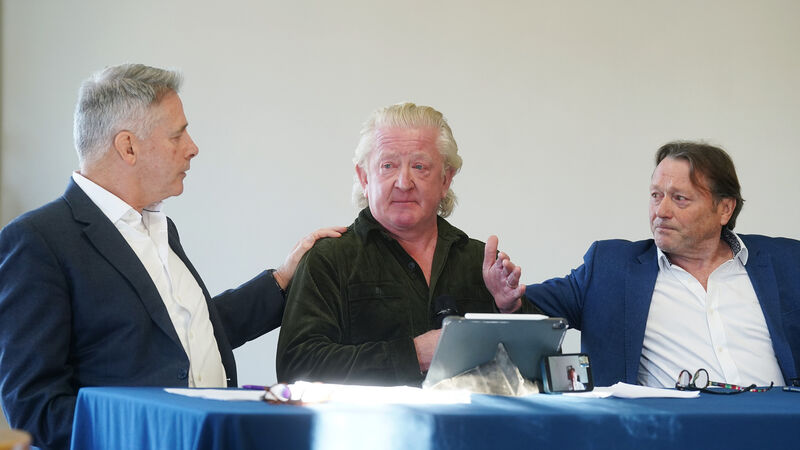Fergus Finlay: Tribunal of inquiry could deliver justice for religious orders’ crimes

Blackrock College past pupils (from left) John Coulter, Corry McMahon and Louis Hoffman, with Philip Feddis joining via phone, at a joint news briefing with the Spiritans in Ireland, at the RDS. Picture: Brian Lawless/PA
LAST week I posed the question here: “Why do we still allow these religious orders to exist?” And I gave my own answer immediately — they are nothing more than vehicles for corruption and abuse, and they need to be shut down.
I got, shall we say, a mixed reaction. And the piece opened up a flood of personal correspondence that I’ve spent a good bit of the week reading. It’s been difficult reading, and I’ll come back to that in a minute.
But there are also people with whom I’ve debated issues over the years (I hope on a basis of reasonable respect) who have chosen to see something pretty sinister in what I wrote.
One letter to the editor of this newspaper made the point that while he agreed with me about shutting down the orders, it’s a pity I didn’t take that view a while ago, when I ‘endorsed the religious Sisters of Charity’s ownership of the National Maternity Hospital’.
That’s actually the opposite of what I did back then. I endorsed a piece of serious work whose outcome was to make certain that no religious organisation would own the National Maternity Hospital; and no religious ethos would influence its operation.

The Iona Institute director and Sunday Times columnist David Quinn, on the other hand, compares me to Kim Jong-un. I used my column to call for the suppression of the religious orders, he says. “Yes, there are precedents for that sort of thing historically,” he goes on, “China, the USSR, North Korea.”
Later on Twitter, he ran a poll among his followers asking them whether I was right or wrong. I was of course shocked and horrified when 75% of David’s followers decided they disagreed with me.
(I do have to say that it is possible to disagree with David Quinn — often trenchantly — without him being personally rude or abusive. He’s a divil for inventing “straw man” arguments, but he’s always civilised. He must get terribly depressed sometimes at the antics of his supporters online. I know he tends to complain about the abuse he gets himself, but if I were him, I think I’d be a bit more anxious about my friends. They’re quite a bunch, even if the vast majority of them prefer to spew bile anonymously.)
At the other end of the spectrum, I guess you’d say, I was criticised by Michael Nugent, the chair of Atheist Ireland.
In a tweet he said: “Like Fergus Finlay, I grew up resisting an authoritarian Ireland. I’m shocked to see Fergus now suggest making religious orders illegal. They should pay tax and be accountable to the law, but they have the same right to exist as any other group.”
In a longer article on the Atheist Ireland website, it says that “it’s not the existence of religious orders that is the problem in Ireland — it’s the privilege and undue influence they have been given by the State”.
But then the article immediately goes on to say that religious orders have consistently abused that privilege and influence — and still do. That leads to the article concluding “in Ireland, we hand over control of most of our schools to an organisation that has enabled paedophiles and covered up their crimes, and whose Irish bishops have lied to and deliberately misled state tribunals about these crimes”.
As Father Dougal once said, ‘I’m hugely confused Ted’.
When I call out the behaviour of the religious orders — in slightly more measured language, actually, than Atheist Ireland — I’m being authoritarian. But in its language, we’re handing over control to paedophiles and their protectors.
Someone somewhere needs to get a grip.
Here’s the real point of the thing. In a different context entirely, I’ve just finished reading a high court judgment about an Irish private sector enterprise that stood accused, and was found guilty, of various “crimes and misdemeanours”, many of them involving the Revenue Commissioners.
One after the other, the directors of that enterprise were told by the judge, directly, that they were prohibited from serving as directors of any company established under Irish law for the maximum period he could impose.
I’d love all these people who think I’m being Kim Jong-un, or just a common or garden authoritarian, to explain why people who run organisations that pay their taxes on time, but cover up the emotional, physical, and sexual abuse of children, shouldn’t be disbarred as leaders of their organisations in exactly the same way.
I’d love them to explain why their organisations should “have the same right to exist as any other group” — as long as they pay their taxes. If cheating the tax system is grounds for disbarment, why isn’t destroying the lives of children?
I received a more important reaction to the piece, I have to say, from the people who contacted me to tell their individual stories.
Stories of brutality and abuse
In the past week, I have read and heard more stories of individual brutality and cruelty — physical, sexual, and emotional — than would be possible to detail here.
That brutality left deep scars. All the more so, maybe, because they were inflicted on generations of boys who couldn’t talk about them, who carried secrets of shame in their heads for a lot of their lives.
Which brings us to what we need to do about it. There’s talk of restorative justice, and it’s a pretty vague concept being promoted by the Holy Ghosts themselves. It may be the case that for some people there’s a mechanism there that enables them to come to terms with the past in a satisfactory way. And that, I guess, is a good thing.
But restorative justice is not justice — especially when the perpetrator has escaped a reckoning, with the help of his organisation, for his entire lifetime. Justice demands full and open accountability, by or on behalf of people who committed awful crimes, and by the organisations that protected them. Justice also demands redress. And justice demands disclosure — not just an accounting, but a full and open accounting.
Is there a mechanism that can achieve all those things? To be honest, I don’t think our Constitution as written allows it.
We’ve tried different forms in the past. Anyone who is trying to closely follow the way in which the Commission of Inquiry into the Grace case is doing its work — six years, round after round of secret meetings, families traumatised, €7m in costs, and no relevant findings at all — would recoil in horror at that approach.
The “least bad” option is probably a full and open tribunal of inquiry, with carefully drafted terms of reference that need to be published in advance and examined by an Oireachtas committee before being settled.
All hearings must be in public and (most importantly) broadcast live, the inquiry chaired by a judge, with two panel members, one representing the broad public interest and the other representing survivors. Going at it that way might make a difference.
But in the meantime, the question remains. As Atheist Ireland puts it, why do we “hand over control of most of our schools to an organisation that has enabled paedophiles and covered up their crimes”? Why do we do it? And what are we going to do about it?
CONNECT WITH US TODAY
Be the first to know the latest news and updates






